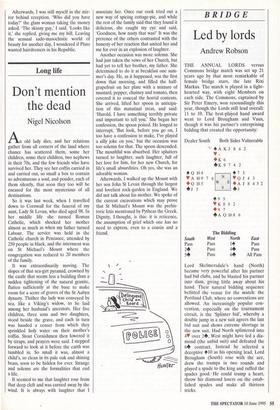Long life
Don't mention the dead
Nigel Nicolson
An old lady dies, and her relations gather from all corners of the land where chance has scattered them, some her children, some their children, two nephews in their 70s, and the few friends who have survived her. They see her coffin carried in and carried out, so small a box to contain so adventurous a soul, and ponder, each of them silently, that soon they too will be encased for the most mysterious of all destinations.
So it was last week, when I travelled down to Cornwall for the funeral of my aunt, Lady St Levan, who died aged 98. In her middle life she turned Roman Catholic, which shocked her mother almost as much as when my father turned Labour. The service was held in the Catholic church in Penzance, attended by 250 people in black, and the interment was on St Michael's Mount where the congregation was reduced to 20 members of the family.
It was extraordinarily moving. The slopes of that sea-girt pyramid, crowned by the castle that seems less a building than a' sudden tightening of the natural granite, flatten sufficiently at the base to make room for a score of graves of the St Aubyn dynasty. Thither the lady was conveyed by sea, like a Viking's widow, to be laid among her husband's ancestors. Her five children, three sons and two daughters, stood beside the grave, and each in turn was handed a censer from which they sprinkled holy water on their mother's coffin. Stout Cornishmen then lowered it by straps, and prayers were said. I stepped forward to look at it before the earth was tumbled in. So small it was, almost a child's, so clean in its pale oak and shining brass, soon to be hidden for ever. Strange and solemn are the formalities that end a life.
It seemed to me that laughter rose from that deep cleft and was carried away by the wind. It is always with laughter that I associate her. Once our cook tried out a new way of spicing cottage-pie, and while the rest of the family said that they found it delicious, she caught my eye and said, 'Goodness, how nasty that was!' It was the pretence of the others contrasted with the honesty of her reaction that united her and me for ever in an explosion of laughter.
Another occasion was more solemn. She had just taken the vows of her Church, but had yet to tell her brother, my father. She determined to do it at breakfast one sum- mer's day. He, as it happened, was the first down that morning, and filled the half- grapefruit on her plate with a mixture of mustard, pepper, chutney and tomato, then covered it to conceal the horrid contents. She arrived, lifted her spoon in anticipa- tion of this matutinal treat, and said: 'Harold, I have something terribly private and important to tell you.' She began her confession, the spoon poised. He longed to interrupt, 'But look, before you go on, I too have a confession to make, I've played a silly joke on you,' but the occasion was too solemn for that. The spoon descended. The mouthful was absorbed. Her splutters turned to laughter, such laughter, full of her love for him, for her new Church, for life's small absurdities. Oh yes, she was an adorable woman.
Afterwards, I walked up the Mount with her son John St Levan through the largest and loveliest rock-garden in England. We did not talk about his mother. We spoke of the current excavations which may prove that St Michael's Mount was the prehis- toric Ictis mentioned by Pytheas the Greek. Dignity, I thought, is this: it is reticence, the assumption of grief which one has no need to express, even to a cousin and a friend.


































































 Previous page
Previous page